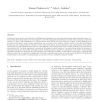Free Online Productivity Tools
i2Speak
i2Symbol
i2OCR
iTex2Img
iWeb2Print
iWeb2Shot
i2Type
iPdf2Split
iPdf2Merge
i2Bopomofo
i2Arabic
i2Style
i2Image
i2PDF
iLatex2Rtf
Sci2ools
139
click to vote
AUTOMATICA
2007
2007
Motion planning in uncertain environments with vision-like sensors
In this work we present a methodology for intelligent path planning in an uncertain environment using vision like sensors, i.e., sensors that allow the sensing of the environment non-locally. Examples would include a mobile robot exploring an unknown terrain or a micro-UAV navigating in a cluttered urban environment. We show that the problem of path planning in an uncertain environment, under certain assumptions, can be posed as the adaptive optimal control of an uncertain Markov decision process, characterized by a known, control dependent system, and an unknown, control independent environment. The strategy for path planning then reduces to computing the control policy based on the current estimate of the environment, also known as the “certainty equivalence” principle in the adaptive control literature. Our methodology allows the inclusion of vision like sensors into the problem formulation, which empirical evidence suggests, accelerates the convergence of the planning algorith...
Related Content
| Added | 08 Dec 2010 |
| Updated | 08 Dec 2010 |
| Type | Journal |
| Year | 2007 |
| Where | AUTOMATICA |
| Authors | Suman Chakravorty, John L. Junkins |
Comments (0)

